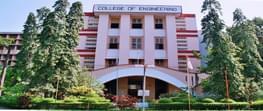Dr. Ashalatha Thampuran is the Director of Mohandas College of Engineering and Technology. From the beginning of her professional education, first at the University of Kerala in a Bachelor of Architecture and further at the University of Roorkee in a Master of Architecture, she has set high standards by securing first rank in both. Thereafter, she did her training in Development Planning at London University. She took her doctorate from the University of Kerala in Traditional Architecture.
Dr. Thampuran started her academic career as a lecturer in the Department of Architecture, College of Engineering, Trivandrum. Here she became an assistant professor and later the Principal. She has over 36 years of experience in different capacities. She is a member of the Council of Architecture, The Indian Society of Technical Education, The All India Housing Development Association, and more. Moreover, she has presented over 26 papers at conferences and published ten papers in reputed journals.
![Mohandas College Of Engineering And Technology - [MCET]](https://images.collegedunia.com/public/image/Profile_87__c904305662f73c8294b7beb53eb6b197.png?tr=w-1200,h-430,c-force)
How would you describe your leadership style?
My leadership style is characterised by a strong emphasis on openness and accessibility. In my role, I maintain an open-door policy, making myself approachable to everyone within the educational institution, be it teachers or students. I encourage individuals to come forward with their concerns and grievances, assuring them that their voices will be heard and action will be taken accordingly. I firmly believe in the delegation of tasks, recognising that I cannot manage everything single-handedly. I collaborate with my team, entrusting them with responsibilities and allowing them to demonstrate their capabilities. This extends to various areas, including financial matters.
We have a hierarchical structure where I do not micromanage every aspect but rather empower each individual to fulfill their role. This system is not without its challenges, but I firmly believe that if we operate solely on suspicion and doubt, progress would be hindered. Instead, I choose to place trust in my team's abilities and the work they produce. Should there be any discrepancies or shortcomings, appropriate measures can be taken to address the situation.
What do you see as the college's greatest strengths and how it can be enhanced?
The greatest strength of Mohandas College lies in the quality of its teaching and education. Recognising the critical importance of having competent and dedicated teachers, I take great care in the selection and appointment processes. When I assumed my role, I secured the management's permission and agreement to have full authority over the hiring decisions. To maintain the highest standards, I follow a meticulous approach to selecting eligible candidates for faculty positions. The selection process involves multiple levels of assessment, including academic qualifications and other relevant criteria.
Having a strong and dedicated faculty is the cornerstone of the college's success. While other facilities and resources are undoubtedly important, it is the quality of teachers and their dedication to their roles that make the most significant impact on students' learning experiences. With an excellent faculty team in place, the college can excel in providing a top-notch education to its students, enabling them to achieve their full potential.
The education systems in India and other foreign countries are structured very differently. In your experience, what can an inbound student gain from studying here in Mohandas College?
When comparing undergraduate education in India to that in foreign countries, Indian institutions may excel at providing more focused and hands-on guidance to students. Foreign institutions may not have the same level of personalised attention at the undergraduate level, which can be a disadvantage for students who require additional support. However, this difference changes when it comes to postgraduate education. In foreign countries, students are often given more independence and are expected to take charge of their learning. Facilities like libraries and other resources are well-equipped, allowing students to explore topics of interest independently. The goal should be to strike a balance between support and independence, ensuring that students can grow academically and develop essential skills for their future endeavours.
How does the curriculum of the college ensure the best practice of industry?
The college's curriculum is designed to cater to various fields and is not solely focused on training students for specific industries. While engineering education is a significant part of the curriculum, the institution aims to develop all faculties and skills in its students. In the initial years, there is an emphasis on providing holistic training, including soft skills and extracurricular activities such as club participation, sports, and music. This approach ensures that students have well-rounded development during their early years in college.
However, as students progress to higher levels, the focus gradually shifts towards preparing them for their professional careers and employability. The college strives to equip students with the necessary skills, knowledge, and experience to excel in their chosen fields and secure jobs in the industry. We try to strike a balance between fostering personal growth and preparing students for the job market.
Check MCET Placement
Any insights into how Mohandas College could be more welcoming to students of different economic backgrounds?
Mohandas College adopts an inclusive approach, ensuring that students from different economic backgrounds are not treated differently based on their financial status. The college does not segregate students based on economic needs or weaker financial backgrounds. The college acknowledges that some students may face financial constraints when it comes to paying fees. In such cases, the institution provides scholarships to support those students who might struggle to meet the financial requirements. By fostering a sense of equality and fairness, the institution promotes an atmosphere where students can focus on their studies and personal growth without feeling marginalized or disadvantaged due to their financial circumstances.
What do you think should be the Mohandas College’s top priority over the next 10 years?
Over the next ten years, Mohandas College's top priority is to focus on transforming its students into job providers rather than job seekers. As an engineering education institution, the college aims to nurture a culture of entrepreneurship and industry-standard skill development among its students. The primary objective is to equip students with the necessary knowledge, skills, and resources to start their own companies and become entrepreneurs. To achieve this goal, the college has established various initiatives and facilities to support student entrepreneurship. These include a start-up company cell and a ED cell, where students receive specialized training and guidance in entrepreneurial endeavors.
What was your vision when you joined Mohandas College?
When I joined Mohandas College, my vision was to create an educational institution that focuses not only on academic excellence but also on the overall development of the students. I sought to establish an environment where students would have the freedom and opportunities to explore their interests in various fields, including sports and arts. To achieve this, I prioritized the development of sports facilities, such as basketball courts, and promoted a culture of inclusivity where students are encouraged to participate in extracurricular activities beyond their academic pursuits. By treating every student with fairness and respect, I aim to create an environment where students feel valued and empowered to excel.
What are some of the biggest challenges you see, both for higher education in general and for Mohandas College Specifically?
One of the biggest challenges facing higher education in India is the lack of awareness and understanding about individual interests and aptitudes among students and parents. Unlike in western countries, where children are often encouraged to explore their passions and interests from a young age, in India, there is a prevalent tendency to follow conventional career paths, particularly in fields like computer science and engineering.
The current generation of students has greater access to information through the internet and exposure to various fields and career opportunities. They have the chance to explore a wide range of interests and gain insights into different professions. To address this challenge, there is a need for enhanced awareness and career guidance programs in educational institutions and among parents.
Any suggestions you would like to give to the current youth and the aspiring students?
My suggestion to the current youth and aspiring students is to be passionate about their pursuits. Passion is the driving force that brings joy and satisfaction to our lives. Being passionate about what you do not only brings fulfillment but also helps you overcome challenges and stay persistent during difficult times. It drives you to continuously improve and excel in your chosen field. Passionate individuals are more likely to find purpose and meaning in their work and are more likely to make a meaningful contribution to society. Therefore, my advice to the youth and aspiring students is to identify their passions, interests, and talents early on. Embrace those passions and commit themselves wholeheartedly to their pursuits.

![Mohandas College of Engineering and Technology - [MCET]](https://image-static.collegedunia.com/public/college_data/images/logos/1559897414mcet.png?h=71.7&w=71.7&mode=stretch)








![Indian Institute of Space Science and Technology - [IIST]](https://image-static.collegedunia.com/public/college_data/images/appImage/25642_IIST.jpg?h=111.44&w=263&mode=stretch)



![Sree Chitra Thirunal College of Engineering - [SCTCE]](https://image-static.collegedunia.com/public/college_data/images/appImage/15186_SSCOENG_APP.jpg?h=111.44&w=263&mode=stretch)





![Sarabhai Institute of Science & Technology - [SIST] Vellanad](https://image-static.collegedunia.com/public/college_data/images/appImage/14935_SIST_NEW.jpg?h=111.44&w=263&mode=stretch)














.png?h=72&w=72&mode=stretch)
 (15).jpeg?h=72&w=72&mode=stretch)
.jpeg?h=72&w=72&mode=stretch)

.png?h=72&w=72&mode=stretch)

![Sree Chitra Thirunal College of Engineering - [SCTCE]](https://image-static.collegedunia.com/public/college_data/images/logos/col27948.jpg?h=72&w=72&mode=stretch)
![Marian Engineering College - [MEC]](https://image-static.collegedunia.com/public/college_data/images/logos/1659499953index.jpg?h=72&w=72&mode=stretch)

![St Thomas Institute for Science and Technology - [STIST]](https://image-static.collegedunia.com/public/college_data/images/logos/1470891063logo.jpg?h=72&w=72&mode=stretch)


![Sarabhai Institute of Science & Technology - [SIST] Vellanad](https://image-static.collegedunia.com/public/college_data/images/logos/1452085025si.png?h=72&w=72&mode=stretch)

![P.A. Aziz College of Engineering and Technology - [PAACET]](https://image-static.collegedunia.com/public/college_data/images/logos/1452687024logo.jpg?h=72&w=72&mode=stretch)

![Kottayam Institute of Technology and Science - [KITS]](https://image-static.collegedunia.com/public/college_data/images/logos/1453359390logo.jpg?h=72&w=72&mode=stretch)
![Heera College of Engineering and Technology - [HCET] Nedumangad](https://image-static.collegedunia.com/public/college_data/images/logos/col13706.jpg?h=72&w=72&mode=stretch)


![ILM College of Engineering and Technology - [ILMCET]](https://image-static.collegedunia.com/public/college_data/images/logos/col13774.jpg?h=72&w=72&mode=stretch)

Comments